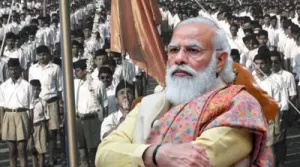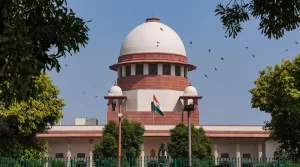Sounding a distinctly different note than the detractors of the Narendra Modi government’s plan to have a new Parliament building, Gujarat’s top Dalit rights leader Martin Macwan has declared that achieving an untouchability free India is “a much bigger challenge” than opposing to the Rs 20,000 crore project seeking to revamp the Central Vista in Delhi.
Macwan told this to a gathering of students and activists at the Dalit Shakti Kendra (DSK), which he founded about 20 km from Ahmedabad two decades ago as Dalit technical-cum-empowerment institute for teenage boys and girls. He was revealing his plan to begin a yatra to Delhi starting August 1 taking the newly minted 1,000 kg brass coin, symbolising untouchability free India.
“We will reach Delhi on August 7 and plan to hand over the huge coin the President, the Lok Sabha Speaker and the Rajya Sabha chairman asking them to ensure that it is placed in the Parliament building as a reminder to the Parliamentarians that even 75 years of independence India is not untouchability free”, he said. “We have sought their appointment.”
Asked whether this suggests he was endorsing the plan to have the new Parliament building as part of a revamped Central Vista, Macwan told Counterview, “Having a Rs 20,000 crore Parliament, though disputable, is a much, much smaller an issue than removing untouchability. Hence we are not insisting on not having the new Parliament building.”
Embossed on the coin, having Dr BR Ambedkar on one side and Lord Buddha on the other, is the query “Will the 1947 dream of untouchability-free India be a reality in 2047?” Releasing a special letter to be handed over along with the coin, he said, it is a request to “collectively accept the brass coin and to place it in the new house of Parliament as a reminder to abolish untouchability.”
Along with the huge brass coin, which was minted with the help of three Dalit artists – Odisha’s Vishwarajan, and Delhi’s Manubhai and Akshaybhai, all of whom worked on it for several months – at the cost of Rs 3 lakh, Macwan said, “We plan to hand over smaller 3 kg brass coins to each Cabinet minister. Also, we are posting still smaller coins, 6 cm diametre each, to all the members of Parliament, along with the letter stating that they should pledge to remove untouchability by 2047, 100th year of India’s Independence.”
Minted from donations received mainly from Dalits from various states of India consisting of 2,450 kg of brass and copper utensils, Macwan said, “Along with the brass coins, we plan to carry with us two trucks of more than 20 lakh one rupee coins, donated by Dalits across India to help the resolve to remove untouchability, to be handed over along with the brass coins in Delhi.”
He added, “As many as 336 in six buses will join the week-long journey to Delhi via Rajasthan and Haryana. We will have meetings in several towns in between. Local communities are taking care of our stay and food.”
Explaining why he thinks the untouchability issue is much bigger than opposing the new Parliament building, Macwan said, in 1932, Gandhiji and Ambedkar agreed that the first thing India would do after achieving Independence was removal of untouchability. “However”, he said, “The first law seeking to remove untouchabililty passed only in 1955. It was called Civil Rights Protection Act.”
Stating that though the anti-untouchability law was amended several time to make it more stringent over the last seven decades, he said, “There has been failure by successive governments to implement it.”
Releasing official data, he said, “Till 1977, we did not even create a data base on atrocities committed against Dalits. The incomplete collection of data between 1977 and 2021 suggest about 26,000 Dalits were murdered, about 60,000 Dalit women were raped, and about 12 lakh atrocities were committed against Dalits. One should remember that these are registered crimes. No data is available for 1987-88. Several states did not provide data. For instance, one year, only eight states provided data.” He offered similar data suggesting indifference towards the Adivasis.
Macwan added, “The data do not have atrocities against those Dalits who got converted to Buddhism till they were recognised as scheduled castes. Besides, there are no data on atrocities committed against Muslim and Christian Dalits.”
Especially taking on the Congress government in Rajasthan to point towards its interia towards the anti-untouchability cause in the main opposition party, Macwan said, “Despite repeated reminders, the statue of Manu, who legalised casteism in Hindu society, has not been removed from the High Court premises. The government does not even care to reply to our pleas on this.”
He added, “There is a High Court stay on removal of the statue following a plea way back in 1971. We have filed a petition to remove the untouchability about two-and-a-half years ago, but it has not come up for hearing. Why is the state government refusing to intervene?”
Asked whether his yatra has been approved by the Gujarat government, he said, “We have applied for it and are waiting for a nod.” Answering another query, he said, “We will return with the brass coins and all the one rupee coins to DSK if they are not accepted. We will wait for 24 hours and then begin with the return journey. The government should understand: About 20 lakh people have been involved in our mission.”
(Courtesy: Counterview, a newsblog that publishes news and views based on information obtained from alternative sources, which may or may not be available in public domain, allowing readers to make independent conclusions.)




